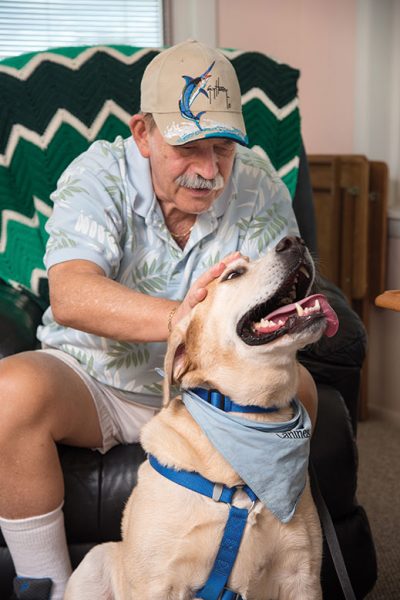
Lisa Mikkelson’s 82-year-old dad doesn’t talk much anymore. But when he sees his friend Earl, he immediately brightens.
“It was love at first sight,” Mikkelson says of the relationship between her father, John A. Gregory, who has Alzheimer’s disease, and Earl, his therapy dog from Caregiver Canines, a nonprofit based in Toms River.
Earl, a 5-year-old yellow Labrador retriever, and his owner, Frank Pirozzi, a retired Air Force mechanic who lives in Brick Township, have visited Gregory once a week at his home in Brick since September. The dog and his latest client have formed a special bond; they even share a stately middle name, Augustus.
“Earl loves his job,” says Pirozzi, “He’s a natural.” Earl, a rescue dog, was adopted by Pirozzi in 2013. In addition to Gregory, the pair visits a local VA hospital on a monthly basis.
Caregiver Canines, established in 2009, works under the umbrella of Caregiver Volunteers of Central Jersey, which provides free services to clients in Ocean and Monmouth counties, including medical transport, respite care and telephone check-ins. The Caregiver Canines program—a service for the homebound elderly or those with memory loss—is unique because it provides in-home visits.
“I was looking for a service that would give my father something to look forward to in his own home,” says Mikkelson. Caregiver Canines was the right fit.
In fact, Danielle Maley, coordinator for Caregiver Canines, calls herself “the matchmaker.” She visits clients at home before matching them with one of the organization’s specially trained and certified dogs.
“Clients who haven’t communicated in years suddenly become animated when they are reminded of a favorite pet,” says Maley.
To qualify, clients must be at least 60 years old and no longer driving. “The dogs are trained to anticipate oncoming wheelchairs, wobbly walkers and beeping medical devices,” says Maley.
The dogs also have an intuitive way of making ailing seniors feel better—no medicines or prescription required.



